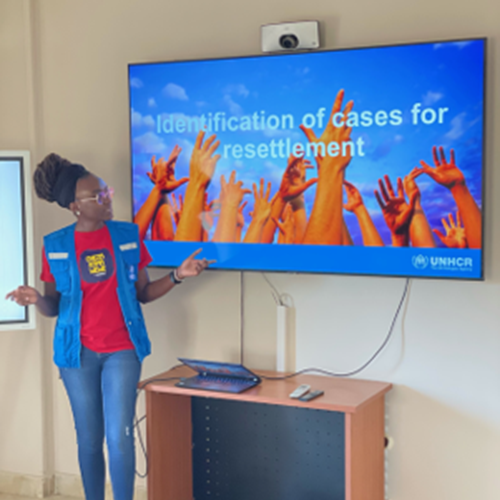News
Stories from the field: "The ultimate way of being good at what you do is to be able to pass on knowledge"
Training others is an integral part of the job for many of the DRC Resettlement Roster members deployed to UNHCR operations globally. So was it for Cynthia Njeru who recently completed a 21-month deployment as Resettlement Expert to UNHCR in Kigali, Rwanda.

Right before heading to Cairo, Egypt for her next deployment, Cynthia was interviewed by Mads Piper, Student Assistant in the DRC Standby Roster, and shared her thoughts on the important trainer role and other aspects of her deployment.
Mads: What was the main objective for your deployment to Kigali, Rwanda?
Cynthia: In the beginning, my objective was to just go and do interviews and case reviews and make sure that all the cases were meeting the standards of the resettlement countries. But when I came to Kigali, I found out that there was a lot more for me to do besides doing reviews. They also had some complex cases that I was meant interview. One of my major roles would also be as resettlement training focal point – for the whole operation not just the Kigali office. Mads: What did a typical workday look like, and can you describe some of your key tasks?
Cynthia: When you are a case worker you are not just doing interviews. The days can be very different. But on a typical interview day, I would get to the office, prepare for the interview, and then in most cases I would spend most of the day interviewing. In Rwanda, we have cases from DR Congo and other countries. I would often interview whole families and that might take a full day. For me interviews are draining, so after that I would probably go back to the house and relax.
Mads: You have worked as a Resettlement Expert since 2019. What motivates you to work with this area?
Cynthia: I think being in resettlement is life changing. I am directly making an impact on people. And we are interacting with refugees during the resettlement process when they are very optimistic about life. They are optimistic about moving to another place and they are looking forward to their life change. I think that keeps me going, that’s why I still like doing the interviews.
Mads: You were in Kigali for almost two years. What would you say were your biggest achievements?
Cynthia: My biggest achievement has been becoming a better case worker in general, not just in the sense of interviewing refugees or reviewing cases. But also becoming more confident in my training skills. Also, I was able to interview more complex cases that I had not interviewed before. Now, I am more confident with interviewing refugees with complex profiles. It could take me two days to interview some of these cases. I mean, that never happened to me before. But I am comfortable now that it wouldn’t shock me to interview such people again. That is a big achievement for me.
Mads: I understand that facilitating training has been a big part of your deployment. Can you describe some of the training work you have done?
Cynthia: We did both in-person and online training. My first training was on Teams, and I was meant to train protection staff on the identification of cases for resettlement. I remember that after my first training, one of the staff came back and asked: “Hey could you send me the training? I found it useful, please share the material.” And I was like ooh, maybe it was okay. Maybe it was useful. So that was my first training, and I loved the experience.
Another training I did was for interpreters who never worked with UNHCR before. They didn’t know anything about UNHCR, so this was a little challenging for me. I decided to involve some of my colleagues who I had previously trained in casework myself. It was great to see people I had trained suddenly training others. After that, it became a routine that we all prepared the training together and delivered it together to the interpreters.
Mads: What other types of training did you do?
Cynthia: For staff members, there were two types of training. One on how to conduct interviews and complete resettlement assessments. And the more informative kind, for example on policy changes and general resettlement updates and reminders.
Mads: What do you think about sharing your expertise with other people?
Cynthia: I think the ultimate way of being good at what you do is to be able to pass on knowledge. And if you can pass on something you know to others, so they understand, it is very fulfilling. And that is what it was for me. It was very fulfilling to see my colleagues, who are also like my friends, go from being new at resettlement to becoming good and being confident in doing their interviews.
Mads: How do you think the training that you have facilitated benefits the general resettlement work?
Cynthia: I think training new case workers creates continuity in the resettlement work and in the sense of people having more knowledge. If someone goes through training, then the quality of their work is better. I am happy to contribute to that.
Mads: What experiences and gained knowledge can you bring with you to your next deployment in Cairo?
Cynthia: I felt good being able to pass on what I know. It is not always easy, you may know something but might not be able to explain it to others. So, it was very good for me to be able to do that. It made me more confident. Now, I look forward to seeing how I fit into the resettlement team and the UNHCR operation in Cairo in general. And of course, I will be happy to contribute to capacity building of staff through case reviews or even in a training setting whenever needed.
